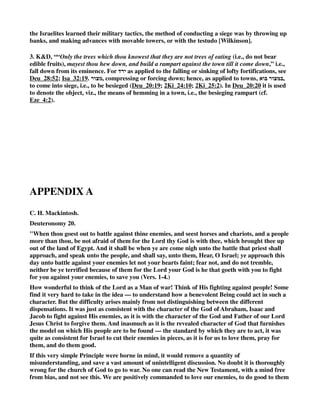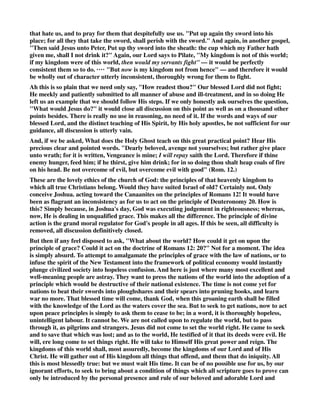This document is a commentary on Deuteronomy 20, focusing on God's encouragement to Israel as they prepare for battle against formidable enemies, reminding them of His presence and past deliverance from Egypt. It discusses the role of a specially appointed priest, called the 'anointed of war', who was to address the troops and bolster their faith before engaging in combat. The commentary uses quotes from various commentators to explore these themes and highlight the importance of divine support in military endeavors.

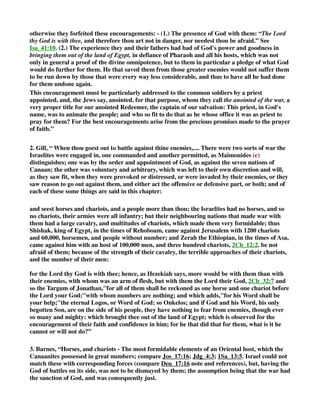
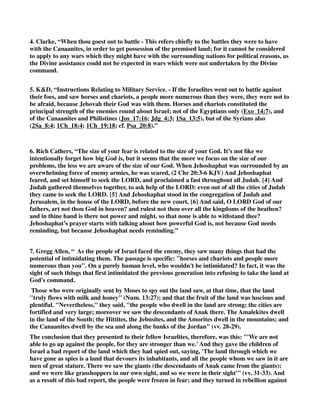


![fight for you against your enemies, to save you. When Israel was obedient, and trusting in God,
they could never lose. But when they were disobedient, or not trusting, they could never win -
even if they had superior forces!”
7. F.B.Meyer, “WHEN Abraham returned from the slaughter of the kings, the priest of the Most
High appeared to welcome him, and to prepare him for the still more subtle encounter which
awaited him with the king of Sodom. As Abraham drew nigh to that battle the priest approached.
Whenever a battle is imminent, look out for the
Priest.--Do not go to the war at your own charges, you cannot stand against the mighty power of
your arch-adversary. Look around, and see the Priest stand. What Priest? The Apostle and High
Priest of your confession. He will offer prayer for you, and anoint your shield with the precious
oil, and put His hand upon your hand as you feebly draw the bow.
What makes you so bold, my lad? the captain asked of a stripling as he went into the fight.
And the answer came quickly, My mother put her hands on my head and blessed me ere I left
our home.
Whenever the Priest has been near, anticipate a battle.--The best hours come to prepare us for
the worst. The clove descends that we may be able to stand for forty days against the devil. Do
not be surprised at this. And whenever some experience of unusual radiance and helpfulness has
visited you, say to yourself, This is God's sweet way of preparing me against coming trial. Let
me walk warily, for danger is near. The Priest has been with me; I am drawing nigh to the battle.
I know not what lies before me: but He is acquainted with the difficulties I have to face and the
fierceness of the adversary I have to encounter. He alone can equip me for the fight.
3 He shall say: “Hear, Israel: Today you are going into
battle against your enemies. Do not be fainthearted or
afraid; do not panic or be terrified by them.
1. Henry, “This priest must, (1.) Charge them not to be afraid (Deu_20:3), for nothing weakens
the hands so much as that which makes the heart tremble, Deu_20:3. There is need of precept
upon precept to this purport, as there is here: Let not your hearts be tender (so the word is), to
receive all the impressions of fear, but let a believing confidence in the power and promise of God
harden them. Fear not, and do not make haste (so the word is), for he that believeth doth not
make more haste than good speed. “Do not make haste either rashly to anticipate your
advantages or basely to fly off upon every disadvantage.” (2.) He must assure them of the
presence of God with them, to own and plead their righteous cause, and not only to save them
from their enemies, but to give them victory over them, Deu_20:4. Note, Those have no reason to
fear that have God with them. The giving of this encouragement by a priest, one of the Lord's
ministers, intimates, [1.] That it is very fit that armies should have chaplains, not only to pray for
them, but to preach to them, both to reprove that which would hinder their success and to raise](https://image.slidesharecdn.com/45487464-deuteronomy-20-commentary-141008122141-conversion-gate01/85/45487464-deuteronomy-20-commentary-6-320.jpg)
![their hopes of it. [2.] That it is the work of Christ's ministers to encourage his good soldiers in
their spiritual conflict with the world and the flesh, and to assure them of a conquest, yea, more
than a conquest, through Christ that loved us.”
2. Gill, “ And shall say unto them, hear, O Israel,.... Exciting their attention to what he was about
to say, and which, as Jarchi observes, was spoken in the holy tongue, or in the Hebrew language:
you approach this day unto battle against your enemies; were marching or ready to march,
preparing to engage with them, and a battle seemed near at hand:
let not your hearts faint, fear not, and do not tremble, neither be ye terrified because of them;
many words are made use of to animate them against those fears which the strength, number,
and appearance of their enemies, would be apt to cause in them. Jarchi observes, that here are
four exhortations, answerable to four things which the kings of the nations do (in order to inject
terror into their enemies); they shake their shields, to clash them one against another, that
hearing their noise they may be afraid of them and flee; they prance their horses, and make them
neigh, to cause the noise of the hoofs of their horses to be heard; they shout with their voices, and
blow with their trumpets: and accordingly these several clauses are so interpreted in the Misnah
(e)and let not your hearts faint; at the neighing of the horses, and the brightness of swords:
fear not; at the clashing of shields: and do not tremble; at the sound of trumpets: neither
be ye terrified at the voice of shouting;''and no doubt but it takes in everything that has a
tendency to cause fear, faintness, and dismay, which they are cautioned against.”
3. Fear is likely to bring about the very thing that is feared. “Carl Wallenda was one of the
greatest tightrope aerialists who ever lived. He once wrote, “For me, to live is being on a
tightrope. All the rest is waiting.” In 1968, he commented that the most important thing about
walking a tightrope is to be confident you can do it and never to think about failure. In 1978,
Wallenda fell to his death from a tightrope that was seventy-five feet up in the air above the city
of San Juan, Puerto Rico. His wife, who is also an aerialist, reported that, for three months prior
to attempting the most dangerous feat he’d ever tried, all he talked about was falling. She said
that never before in all their career together had Carl ever given a thought to falling. She noted
further that he spent all of his time prior to that fatal walk putting up the wire (which he had
never bothered with before). He worried about the guidewires and spent endless hours
calculating the wind, which he had also never done before. After his death, she said, “I believe the
reason Carl fell was because he spent all of his time preparing not to fall, instead of spending time
preparing to walk the rope.” -- H. Edwin Young, Building Blocks, Southern Baptist Preaching
Today, ed. Allen and Gregory, p. 457.
4 For the LORD your God is the one who goes with you to
fight for you against your enemies to give you victory.”
1. Gill, “For the Lord your God is he that goeth with you,.... To battle, and therefore they had no](https://image.slidesharecdn.com/45487464-deuteronomy-20-commentary-141008122141-conversion-gate01/85/45487464-deuteronomy-20-commentary-7-320.jpg)
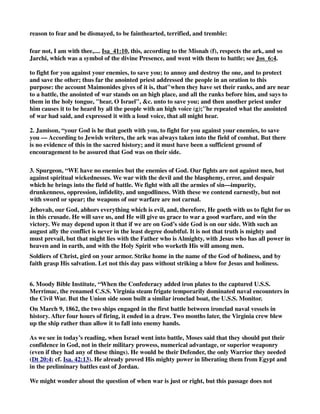

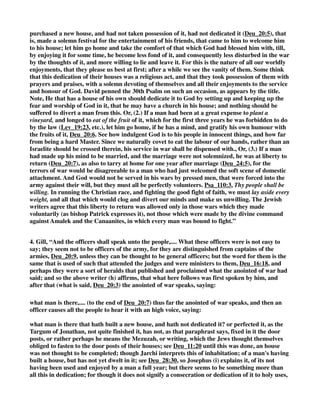


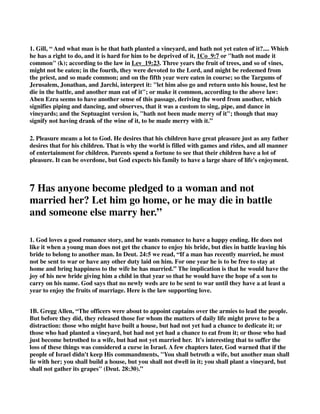

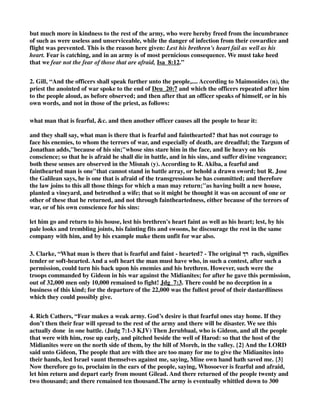






![the common interpretation, the following reasons are given.
God, who knows all things, saw that they were incurable in their idolatry; that the cup of their
iniquity was full; and as their Creator, Sovereign, and Judge, he determined to destroy them from
off the face of the earth, “lest they should teach the Israelites to do after all their abominations,”
Deu_20:18. After all, many plausible arguments have been brought to prove that even these seven
Canaanitish nations might be received into mercy, provided they,
1. Renounced their idolatry;
2. Became subject to the Jews; and,
3. Paid annual tribute: and that it was only in case these terms were rejected, that they were
not to leave alive in such a city any thing that breathed, Deu_20:16.
4. KD, “Deu 20:10-11 - “Instructions Concerning Sieges. - Deu_20:10, Deu_20:11. On
advancing against a town to attack it, they were “to call to it for peace,” i.e., to summon it to make
a peaceable surrender and submission (cf. Jdg_21:13). “If it answered peace,” i.e., returned an
answer conducing to peace, and “opened” (sc., its gates), the whole of its inhabitants were to
become tributary to Israel, and serve it; consequently even those who were armed were not to be
put to death, for Israel was not to shed blood unnecessarily. * does not mean feudal service, but
a feudal slave (see at Exo_1:11).
5. Jamison, “Deu 20:10-20 - “When thou comest nigh unto a city to fight against it, then proclaim
peace unto it — An important principle is here introduced into the war law of Israel regarding
the people they fought against and the cities they besieged. With “the cities of those people which
God doth give thee” in Canaan, it was to be a war of utter extermination (Deu_20:17,
Deu_20:18). But when on a just occasion, they went against other nations, they were first to make
a proclamation of peace, which if allowed by a surrender, the people would become dependent
[Deu_20:11], and in the relation of tributaries the conquered nations would receive the highest
blessings from alliance with the chosen people; they would be brought to the knowledge of
Israel’s God and of Israel’s worship, as well as a participation of Israel’s privileges. But if the
besieged city refused to capitulate and be taken, a universal massacre was to be made of the
males while the women and children were to be preserved and kindly treated (Deu_20:13,
Deu_20:14). By this means a provision was made for a friendly and useful connection being
established between the captors and the captives; and Israel, even through her conquests, would
prove a blessing to the nations.
11 If they accept and open their gates, all the people in it
shall be subject to forced labor and shall work for you.
1. Henry, “Some think that even the seven nations of Canaan were to have this offer of peace
made to them; and the offer was no jest or mockery, though it was of the Lord to harden their
hearts that they should not accept it, Jos_11:20. Others think that they are excluded (Deu_20:16)](https://image.slidesharecdn.com/45487464-deuteronomy-20-commentary-141008122141-conversion-gate01/85/45487464-deuteronomy-20-commentary-22-320.jpg)
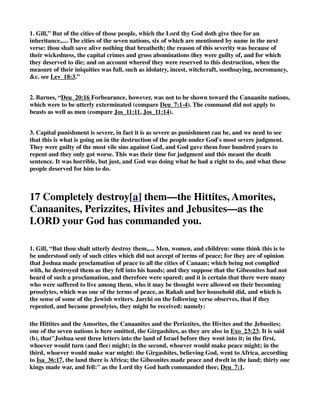
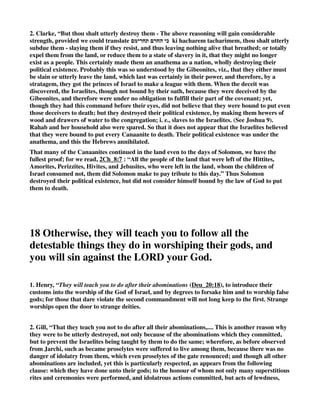


![1. Gill,” But of the cities of those people, which the Lord thy God doth give thee for an
inheritance,.... The cities of the seven nations, six of which are mentioned by name in the next
verse: thou shalt save alive nothing that breatheth; the reason of this severity was because of
their wickedness, the capital crimes and gross abominations they were guilty of, and for which
they deserved to die; and on account whereof they were reserved to this destruction, when the
measure of their iniquities was full, such as idolatry, incest, witchcraft, soothsaying, necromancy,
c. see Lev_18:3.”
2. Barnes, “Deu_20:16 Forbearance, however, was not to be shown toward the Canaanite nations,
which were to be utterly exterminated (compare Deu_7:1-4). The command did not apply to
beasts as well as men (compare Jos_11:11, Jos_11:14).
3. Capital punishment is severe, in fact it is as severe as punishment can be, and we need to see
that this is what is going on in the destruction of the people under God's most severe judgment.
They were guilty of the most vile sins against God, and God gave them four hundred years to
repent and they only got worse. This was their time for judgment and this meant the death
sentence. It was horrible, but just, and God was doing what he had a right to do, and what these
people deserved for him to do.
17 Completely destroy[a] them—the Hittites, Amorites,
Canaanites, Perizzites, Hivites and Jebusites—as the
LORD your God has commanded you.
1. Gill, “But thou shalt utterly destroy them,.... Men, women, and children: some think this is to
be understood only of such cities which did not accept of terms of peace; for they are of opinion
that Joshua made proclamation of peace to all the cities of Canaan; which being not complied
with, he destroyed them as they fell into his hands; and they suppose that the Gibeonites had not
heard of such a proclamation, and therefore were spared; and it is certain that there were many
who were suffered to live among them, who it may be thought were allowed on their becoming
proselytes, which was one of the terms of peace, as Rahab and her household did, and which is
the sense of some of the Jewish writers. Jarchi on the following verse observes, that if they
repented, and became proselytes, they might be received: namely:
the Hittites and the Amorites, the Canaanites and the Perizzites, the Hivites and the Jebusites;
one of the seven nations is here omitted, the Girgashites, as they are also in Exo_23:23. It is said
(b), thatJoshua sent three letters into the land of Israel before they went into it; in the first,
whoever would turn (and flee) might; in the second, whoever would make peace might; in the
third, whoever would make war might: the Girgashites, believing God, went to Africa, according
to Isa_36:17, the land there is Africa; the Gibeonites made peace and dwelt in the land; thirty one
kings made war, and fell: as the Lord thy God hath commanded thee; Deu_7:1.](https://image.slidesharecdn.com/45487464-deuteronomy-20-commentary-141008122141-conversion-gate01/85/45487464-deuteronomy-20-commentary-27-320.jpg)

